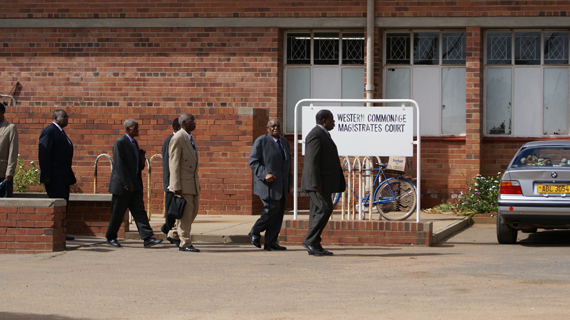
THE troubled Apostolic Faith Mission (AFM) of Africa overseer reverend Tony Tshuma has filed an application at the Supreme Court seeking to nullify the ruling made by Bulawayo High Court judge Justice Maxwell Munodawafa Takuva on May 27 barring him from demoting or expelling three church ministers opposed to his leadership.
SILAS NKALA STAFF REPORTER
Reverends — Clement Nyathi, Joseph Matongo and Morris — filed an application at the High Court seeking an order barring Tshuma and his supporters from demoting or expelling them from the church.
They sought relief barring Tshuma and his group from making any decisions concerning the dispute until the finalisation of two other cases pending in the High Court.
Justice Takuva issued an order barring Tshuma and fellow ministers from making church decisions which involve disputes before the court. On Thursday last week, Tshuma and 25 ministers through their lawyer Walter Nyabadza, who instructed Thabani Mpofu in Harare, filed an appeal against the High Court ruling on the case.
He indicated that the court erred and misdirected itself in coming to the conclusion that first respondent (AFM) was properly constituted before the court in the absence of any allegation or demonstration of authority to bring proceedings in its name on the part of second to fourth respondents.
AFM, Nyathi, Matongo and Morris are cited as first to fourth respondents respectively, while Tshuma and 25 ministers are the applicants.
“Appellants appeal against the whole of judgment of the High Court of Zimbabwe, per Justice Takuva in case NO HC1092/14 handed down at Bulawayo on May 27,” the application reads.
- Chamisa under fire over US$120K donation
- Mavhunga puts DeMbare into Chibuku quarterfinals
- Pension funds bet on Cabora Bassa oilfields
- Councils defy govt fire tender directive
Keep Reading
In their grounds of appeal, Nyabadza stated that fortiori (for an even stronger reason) the court erred in effectively granting control of first respondent (AFM) to Nyathi, Matongo and Morris under circumstances where they previously never had such control.
“The court aquo erred in effectively coming to the conclusion that second to fourth respondents could institute and maintain an actiones popularis (to obtain remedy by a person or a group in the name of the collective interest),” the application reads.
“It having been common cause that first appellant (Tshuma) has been the head of first respondent (AFM) for a period in excess of six years, the court aquo erred in interfering with his discharge of function which discharge had not been questioned for all this while.
“The court aquo misdirected itself in effectively coming to the conclusion that the pending disputes between the parties had a substantive effect on the leadership of the church and on how it is to be run when it is clear that the dispute is founded upon the applicable constitution and not first appellant’s ascension to office.”
The application also states that the court aquo erred in affording second to fourth respondents relief under circumstances where they did not demonstrate the existence of a substantive right and critically had not shown how all the respondents had undermined any such right.
“A fortiori, the court erred in affording an interdict under circumstances where requirements for the grant of an interdict were not met. The court aquo erred in all circumstances in affording blanket relief which is susceptible to all manner of abuse and whose application cannot be demarcated with ease,” the application reads.”
The application also states that the relief sought was that the instant appeal succeeds with costs and that judgment of the court aquo be overturned to read as follows: “The application be and is hereby dismissed with costs.”
The Lobengula-headquartered AFM is embroiled in a bitter power wrangle with a faction led by Nyathi challenging Tshuma’s authority and accusing him of having imposed himself as head of the church.










